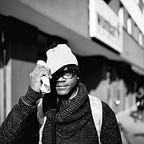Watching Burna Boy celebrate his Grandad
NB: Today is Benson Idonije’s 84th birthday. The piece below was written on the occasion of his 80th birthday. It perhaps provides a window into his famous grandson’s psychology.
Over the weekend, I was at a party for the music writer and critic Benson Idonije, who clocked 80. Put together by the Committee for Relevant Art, the party had Idonije’s grandson Burna Boy performing. Idonije wrote a column for the Guardian for many years and now many friends and immediate family members were present to celebrate him. Venue was the Freedom Park amphitheatre on Lagos Island.
As the clouds darkened, light rains turned to a downpour, halting Burna Boy’s performance. Many people left. Many more people waited. Burna had burned only a small hole through his discography, and we had to see him run through the whole thing.
Both audience and singer converged elsewhere within the park. A band played in the interval. Food and drinks went round but Burna Boy was the main event. Clad in a black fitting outfit, gold necklace bouncing off the light, the man conversed with guests. He was smiling, chatting, waiting his time. Girls were present, sporting excellent make-up, perhaps hidden dimples, and — who knows? — 25 bracelets spread over each wrist. Outside of the building, the rains had turned to a drizzle.
Burna had arrived with an entourage. Two famous faces in tow. General Pype and Phyno.
“When will you get on?” a guest asked.
“I don’t know o,” Burna responded smiling. “E fit be anytime. Na as the spirit move.”
In a few minutes, it was time.
The hits tumbled out from his mouth. ‘Don Gorgon’, ‘Like to Party’, ‘Soke’. He was playing live, cruising from song to song, insisting he was having fun even as it was hard to imagine a better performance. The crowd cheered. They loved him. He invited his friends onstage. General Pype belted out the immortal ‘Champion’, his fast-paced patois drawing applause. Phyno got on. He did a dazzling improvisation, and ended with the gospel-tinged ‘Fada Fada.’ The backing band was excellent.
At some point, Dede Mabiaku, the half-forgotten man of afrobeat, got onstage and told a story about Burna Boy and his parents, both of whom were dancing. His dad in particular appeared to know the lyrics of all of his boy’s songs, including a not very popular one about weed. His very savvy mum and manager showed-off dance steps and her successful son — the one to every guest, the other to important persons seated.
According to Dede, Burna’s parents “fought and fought” the boy to face school. The boy may have been unhappy at the time. Now though, here he was. The hero. The past forgotten, his parents smiled through Dede’s speech and continued dancing afterwards.
In true Nigerian style, people sang prayers to God, asking that they live to see 80. Just like Uncle Ben. I was, however, thinking up another prayer: for those striving in the uncertain, immensely shaky terrain of the arts in a third world country: The stats and the stars are not aligned favourably, not when success in the third world is measured exclusively in financial terms. So this was my prayer for those ones: May success come in time to give you joy, and prove certain figures wrong. If you go against your parents, may you find success in this other field you have pursued.
The alternative will be hard to take. Can you imagine black sheep Burna Boy, in a corner, as his family celebrates its patriarch, having failed in school and then in music? It seemed like a thought worth pursuing. But maybe not quite. Not at a party.
Burna Boy sang a few Fela tunes. I sang along, drink in hand. And it occurred to me that one of Fela’s songs could easily have become soundtrack to Burna Boy’s life. If he had flunked in school and then in music, that soundtrack would contain the words, “Double Wahala.”
